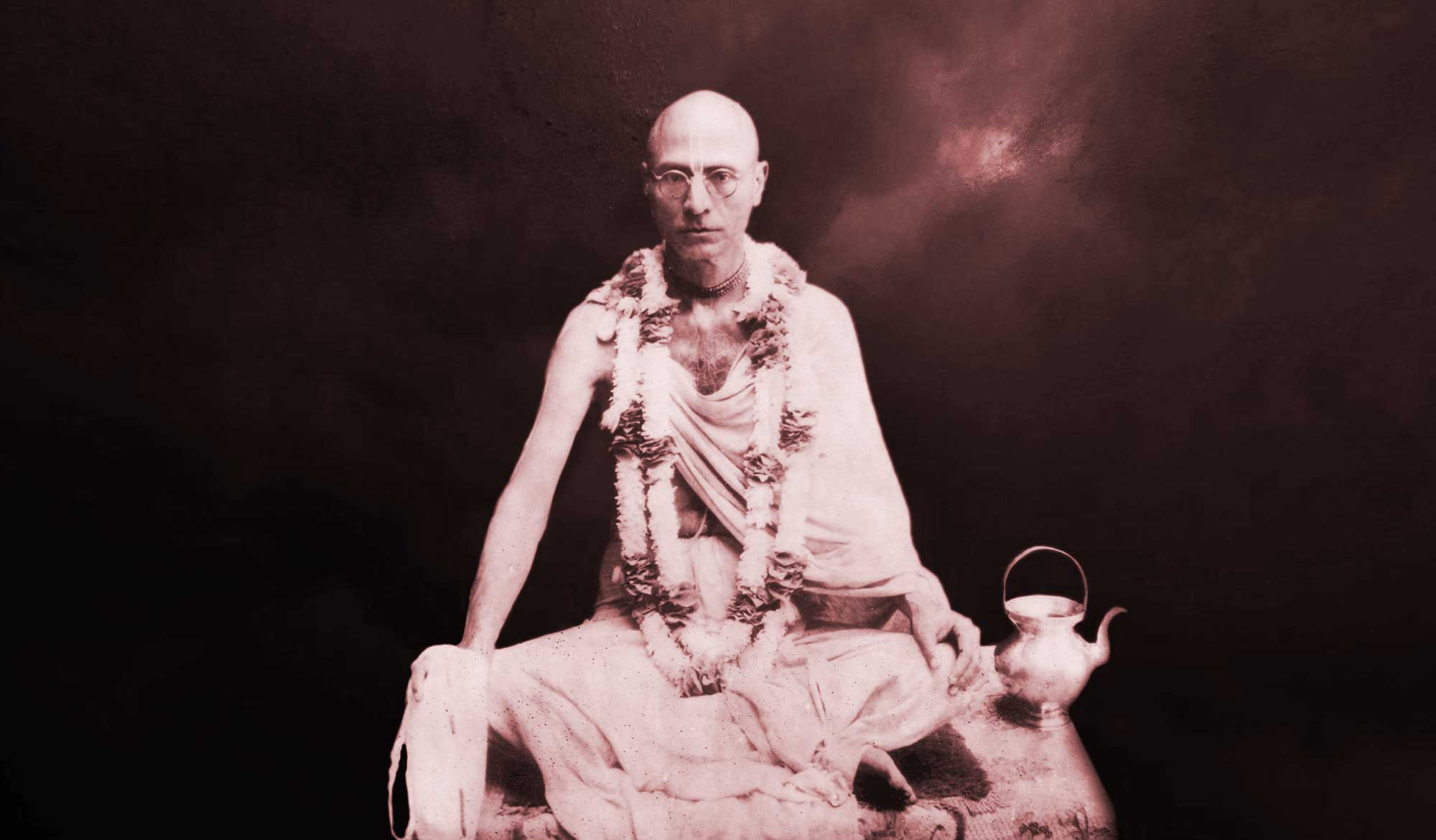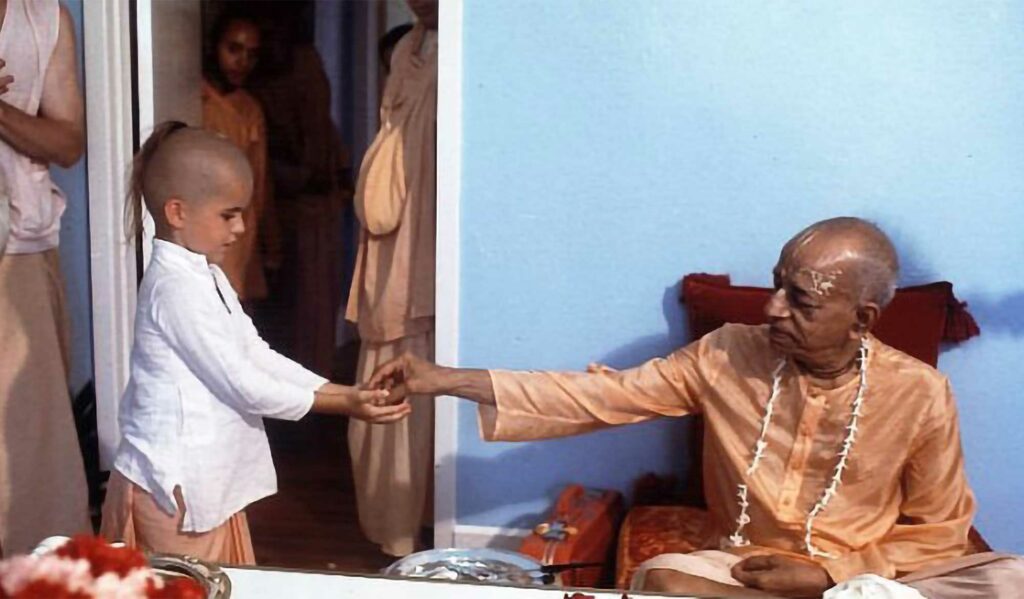Overview
The following Bengali poem, in glorification of Śrīla Bhaktisiddhānta Sarasvatī Ṭhākura Prabhupāda, was composed by Śrīla Śrīdhara Deva Gosvāmī Mahārāja prior to his acceptance of sannyāsa, and first published in the Dainika Nadīya Prakaśa on Sunday, 11th June, 1927. This poem was translated into English by Sanātana Dāsa and edited by Swami B.V. Giri.
(1)
yakhana yakhana dharmera glāni
adharama-abhi udglāna haya
sādhu pavitrāṇa duṣkṛti vināśa
dharama sthāpane ei he udaya
“Whenever and wherever there is a decline in dharma, and a predominant rise of adharma—at that time I descend Myself. To deliver the pious and to annihilate the miscreants, as well as to re-establish the principles of religion, I Myself appear.”
(2)
(ei) śrī gītā kathitā, bhagavatī vāṇī
saphala kariyā udita āji
śrī gauḍa gagane, āveśāvatāra
vitariyā nava kiraṇa rāji
“These words, uttered by the Lord in Bhagavad-gītā, have been fulfilled today. On the horizon of Gauḍa-deśa an empowered avatāra has appeared, distributing new rays of light everywhere.”
(3)
mugdha jagata, cakita nayaṇe
bhātiche nīrava bhakati he
dekhe nāi kabhu, śune nāi kabhu
bhakata vatsala e rūpa he
“The entire world is enchanted and awe-struck. Such devotional sentiments and lustre have rendered all speechless. One who is so compassionate to the devotees has never been seen nor heard of before.”
(4)
āni purātana, sanātana dhana
vitaraṇa tār e nava caṅde
kabe ke kareche, jivera lāgiyā
kāhāra erūpa parāṇa kāṅde
“Bringing a wealth which is ancient and eternal, that personality, who is like a new moon, distributes it to one and all. Who has ever given such benefit to the jīvas? Whose heart has ever cried out in pity like this?”
(5)
ā-caṇḍāle diyā, preme adhikāra
mahāprabhura mahāvadānya līlā
khāuyā parā bhāva, vahana kariya
bhajana kāraṇa e kona khelā
“Just as in Mahāprabhu’s most magnanimous pastimes, he gives even the caṇḍalas the qualification to receive love divine. It is simply his pastime to taste the highest ecstasy and carry that everywhere for the purpose of bhajana”.
(6)
nitya yukta kare, yoga mokṣa sadā
āmi e tādera vahana kari
pratijñā gītāya, dhareche ākāra
kāhāra dayāya āhā re mari
“’I provide for those who are eternally engaged on the path of yoga and liberation.’ That promise in the Gītā has now taken shape. Who else is as merciful? I faint to even think of it!”
(7)
āpane ācari, sakala aṅga
hāte dhari sabe śikhāche āja
pāṣaṇḍa dalane, ajeya teja
dhāṅdhiyā nayana karicha virājata
“He personally practices all the aṅgas of bhakti and today he holds hands with all those that he teaches. He defeats the atheists with his invincible power, dazzling the eyes of all.”
(8)
pāche bhaviṣyate, tava anugate
kona kāle keha kare ākramaṇa
(tāi) kari ākarṣaṇa, śakra āstra-gaṇa
kariteche ebe saba nirasana
“Lest in future anyone attacks your surrendered servants at any time, you will attract all the mighty weapons of their enemies and render them ineffective.”
(9)
adūre se dina, nikhila bhuvana
añjali pūrita kusumakare
kṛtañja hṛdaye, rājīvacaṇa
karibe pūjana bhakata bhave
“That day is not far off, when the entire world will offer you prayers with handfuls of flowers. With a grateful heart, they will fold their hands and offer worship to your lotus feet in a mood of devotion.”
(10)
phalgu tyāgī jārā, sādhu bale tārā
jagate vidita chila tatadina
rūpa-anugata, se yukta vairāgya
tāra dhvajā tumi karile ujjīna
“For so long now, the world has known only pseudo-renunciates and those that call themselves sādhus. But the followers of Śrī Rūpa have come to propound yukta-vairāgya and you have come to fly their flag.”
(11)
bhajana sopāna, daiva-varṇāśrama
śāstra-vidhi mata sthāpana karile
smarta jaḍa-vāda, kari nirasana
ati-martya tava līlā prakāśale
“You have come to establish daivi-varṇāśrama, which is a stepping-stone towards bhajana, and the process of following the scriptural injunctions. Rejecting materialistic smartavāda, you manifest your supramundane pastimes.”
(12)
bhoga, yoga tyāga, ādi yata patha
māyāra chalanā kevala se saba
śuddhā bhakati, jīvātmāra vṛtti
sthāpile se mata projvita kaitava
“The various paths of exploitation, the process of yoga, austerities etc. are all simply Māyā’s tricks. Pure bhakti is the occupational duty of the jīvātma. Establishing this principle, you discard all sorts of deception.”
(13)
śrī-mūrti śrī-nāma, śrī-grantha vyākhyāna
bhogera tāṇḍava esara dvāre
vyepe chila deśa, kari huṅhuṅkāre
hānile vraja tāhāra śire
“In the name of Deity worship, the Holy Name, and scriptural explanations, everyone was engaged in a suicidal dance of material enjoyment. The country was in a total state of self-deception. But by your loud roaring, you struck its very head with a thunderbolt.”
(14)
vyabhicāra bharā, e dharā dhāme
kona loka hote āsiyācha he
sakali śodhiyā, karicha nūtana
sakalei bhāṅgiyā gaḍīcha he
“From which planet have you come from to appear in this degraded world, which is full of corruption and immorality? Purifying and correcting everything, you are making them anew. By breaking everything, you are rebuilding it again.”
(15)
nāhi jāni kona, sukṛtira bale
peyechi smaraṇa u caraṇatale
kāmanā ekhana, he dīna śaraṇa
pada chāḍā yena nāhi kona kale
“I do not know by the power of which type of sukṛti I am able to remember him and take shelter at his feet. O shelter of the poor, my only desire now is that I may never be separated from your lotus feet.”
(16)
kṣanerkera kleśa, yāthā kare nāśa
kata śuni tāra yaśa-gāthā gāna
anādi kālera, āśru muchāiyā
ditecha jīvera nityānanda sthāna
“He eradicates momentary tribulations and I hear so many songs singing his glories. By wiping away the tears accumulated from time immemorial, he is giving the living entities the position of eternal happiness.”
(17)
ye dāna ditecha, ki bujhiva morā
āvṛta nayana avidyāra bale
mahimā tomāra, jāne muktakula
tava yaśogana goloka-maṇḍale
“How can we understand the charity that you are distributing, when our eyes are covered by the power of ignorance? Your glories are known by liberated souls and songs praising you are sung in the realm of Goloka.”
(18)
devatā-rāñjita, u pada kamale
reṇurūpe sthāna māge e dāsa
yogyatā vicāre, se guṇatu nāi
tava ahaitukī krpā mātra āśa
“This servant asks for the position of a speck of dust at your lotus feet, which are worshipped by the Devas. When I consider my eligibility, I find that I do not even have any redeeming qualities. My only hope is your causeless mercy.”
(19)
ei bhikṣā āra, śrī caraṇe māgi
pūrāve vāsanā viśvāsa mora
sadā niṣkapa†e, guru-gaura-sevā
karyā tāhāte thāki yena bhora
“This is what I beg and request at your holy feet, as it is my firm belief that my desire will be fulfilled – may I always remain absorbed in serving Śrī Guru and Śrī Gaura without duplicity.”
(20)
sadācāra yuta, brāhmaṇa paṇḍita
ghare janamiyā chila abhimāna
eke dekhe hāya, tulanā nā haya
āsamān-jāman bheda vidyamāna
“I was proud of possessing proper conduct and being born in the home of a brāhmaṇa scholar. Now I see there is no comparison. There is no comparison and they exist poles apart from each other.”
(21)
vaṁśa vidyā dhana, rūpa abhimāna
kariyā haraṇa deha ei vara
jīvane maraṇe, u caraṇa vine
nāhi jāne dāsa rāmendra-sundara
“Kindly bless me by removing my pride in having a noble birth, knowledge, wealth or beauty. In life or death, this servant, Rāmendra-sundara knows nothing except your lotus feet.”
Related Articles, Songs and Prayers
- Śrī Gaura-hari Kusuma Stavāṣṭākam by Śrīla Bhakti Rakṣaka Śrīdhara Deva Gosvāmī
- Śrī Kusumañjalī (An Offering of Flowers) by Śrīla Bhakti Rakṣaka Śrīdhara Deva Gosvāmī
- Śrī Nāma Māhātmya (The Glories of the Holy Name) by Śrīla Bhakti Rakṣaka Śrīdhara Deva Gosvāmī
- Śrī Nityānanda Dvādaśakam by Śrīla Bhakti Rakṣaka Śrīdhara Deva Gosvāmī
- Śrīmad Bhaktivinoda Viraha Daśakam by Śrīla Bhakti Rakṣaka Śrīdhara Deva Gosvāmī
- Śrī Śrī Gaurasundara Āvirbhava Vāsare by Śrīla Bhakti Rakṣaka Śrīdhara Deva Gosvāmī
- ‘The Best of Thieves’ – An Illumination by Śrīla Bhakti Rakṣaka Śrīdhara Deva Gosvāmī
- Mā Muñca Pañca-daśakam (Fifteen Verses Praying Not to be Abandoned) by Śrīla Śrīdhara Deva Gosvāmī Mahārāja
- Śrīla Sarasvatī Gosvāmyāṣṭakam by Śrīla Śrīdhara Deva Gosvāmī Mahārāja
- Vṛndāvane Bhajana (Worship in Vṛndāvana) by Śrīla A.C. Bhaktivedānta Swami Prabhupāda
- Vaiśiṣṭyāṣṭaka (Eight Stanzas of Significance) by Śrīla A.C. Bhaktivedānta Swami Prabhupāda
- Svasti No Gaura-vidhur Dadhātu (May the Moon-like Gaura Bestow Auspiciousness) by Śrīla B.P. Purī Mahārāja
- A Prayer Composed on the Occasion of the Disappearance of Śrīla Gadādhara Paṇḍita by Śrīla Bhakti Pramoda Purī Gosvāmī
- Śrī Śrī Gaura Gopāla Praśasti (In Praise of Śrī Śrī Gaura Gopāla) by Śrīla Bhakti Pramoda Purī Gosvāmī
- Viraha-Gītikā (A Song of Separation) by Śrīla Bhakti Pramoda Purī Mahārāja
- Jaya Rādhā-Mādhava by Śrīla Bhakti Gaurava Narasiṅgha Mahārāja
- Purport to Śrīla Prabhupāda-līlā Smaraṇa-Maṅgala Stotram by Śrīla Bhakti Gaurava Narasiṅgha Mahārāja
- Purī Mahārāja’s Praṇāma Mantra by Śrīla Bhakti Gaurava Narasiṅgha Mahārāja
- Śrī Guru-viraha Ṣaṭakam – Six Verses in Separation from Śrī Guru by Swami B.V. Giri
- Śrī Guru Praṇāma Anuvākya – An Explanation of Śrīla Guru Mahārāja’s Praṇāma Mantra by Swami B.V. Giri
Further Reading from the Bhaktivinoda Institute
- Gītā-mālā (A Garland of Songs) by Śrīla Bhaktivinoda Ṭhākura (Songbook)
- Kalyāṇa Kalpataru (‘The auspicious Desire Tree’) by Śrīla Bhaktivinoda Ṭhākura (Songbook)
- Śaraṇāgati (Surrendered to the Lord’s Shelter) by Śrīla Bhaktivinoda Ṭhākura (Songbook)
- Gītāvalī (A Collection of Songs) by Śrīla Bhaktivinoda Ṭhākura (Songbook)
- Bāula Saṅgīta by Śrīla Bhaktivinoda Ṭhākura (Songbook)
- Sevā Lālasā (Hankering for Service) by Śrīla Bhaktivinoda Ṭhākura (Songbook)
- Śrī Godruma-candra Bhajanopadeśa by Śrīla Bhaktivinoda Ṭhākura
- Śrī Kṛṣṇacandra by Śrīla Bhaktivinoda Ṭhākura
- Śrī Gīta Govinda Introduction by Śrīla Bhaktivinoda Ṭhākura
- Poems by Śrīla Bhaktivinoda Ṭhākura
Prema Dhāma Deva Stotram with the Narasiṅgha Sevaka Commentary – Verses 61-65
In verses 61 to 65 of 'Prema Dhāma Deva Stotram', Śrīla Śrīdhara Mahārāja narrates the pastime of Śrī Caitanya at Caṭaka Parvata In Purī and explains how the scriptures produced by Brahmā and Śiva are ultimately searching for the personality of Mahāprabhu who is merciful too all jīvas, no matter what their social position.
Prabhupāda Śrīla Sarasvatī Ṭhākura’s Visit to Ayodhyā
With the forthcoming observance of Śrī Rāma Navamī, we present 'Prabhupāda Śrīla Sarasvatī Ṭhākura’s Visit to Ayodhyā' written by Śrīla Bhaktisiddhānta Sarasvatī Ṭhākura Prabhupāda from The Gaudīyā magazine, Vol 3. Issue 21/ In December 1924, after visiting Benares and Prāyāga, Sarasvatī Ṭhākura visited the birth-site of Śrī Rāmācandra in Ayodhyā.
Śaraṇāgati – The Only Path to Auspiciousness
In this article, 'Śaraṇāgati - The Only Path to Auspiciousness', Dhīra Lalitā Dāsī analyses the process of śaraṇāgati (surrender) beginning with śraddhā (faith). She also discusses the role of śāstra and the Vaiṣṇava in connection with surrender.
Ātma Samīkṣā – The Value of Introspection
In this article, "Ātma Samīkṣā – The Value of Introspection" Kalki Dāsa highlights the importance of introspection in the life of a devotee and especially in relation to the worldly environment that surrounds us. He also explains how transcendental sound influences our capacity to introspect.
Prema Dhāma Deva Stotram with the Narasiṅgha Sevaka Commentary – Verses 61-65
In verses 61 to 65 of 'Prema Dhāma Deva Stotram', Śrīla Śrīdhara Mahārāja narrates the pastime of Śrī Caitanya at Caṭaka Parvata In Purī and explains how the scriptures produced by Brahmā and Śiva are ultimately searching for the personality of Mahāprabhu who is merciful too all jīvas, no matter what their social position.
Prabhupāda Śrīla Sarasvatī Ṭhākura’s Visit to Ayodhyā
With the forthcoming observance of Śrī Rāma Navamī, we present 'Prabhupāda Śrīla Sarasvatī Ṭhākura’s Visit to Ayodhyā' written by Śrīla Bhaktisiddhānta Sarasvatī Ṭhākura Prabhupāda from The Gaudīyā magazine, Vol 3. Issue 21/ In December 1924, after visiting Benares and Prāyāga, Sarasvatī Ṭhākura visited the birth-site of Śrī Rāmācandra in Ayodhyā.
Śaraṇāgati – The Only Path to Auspiciousness
In this article, 'Śaraṇāgati - The Only Path to Auspiciousness', Dhīra Lalitā Dāsī analyses the process of śaraṇāgati (surrender) beginning with śraddhā (faith). She also discusses the role of śāstra and the Vaiṣṇava in connection with surrender.
Ātma Samīkṣā – The Value of Introspection
In this article, "Ātma Samīkṣā – The Value of Introspection" Kalki Dāsa highlights the importance of introspection in the life of a devotee and especially in relation to the worldly environment that surrounds us. He also explains how transcendental sound influences our capacity to introspect.








